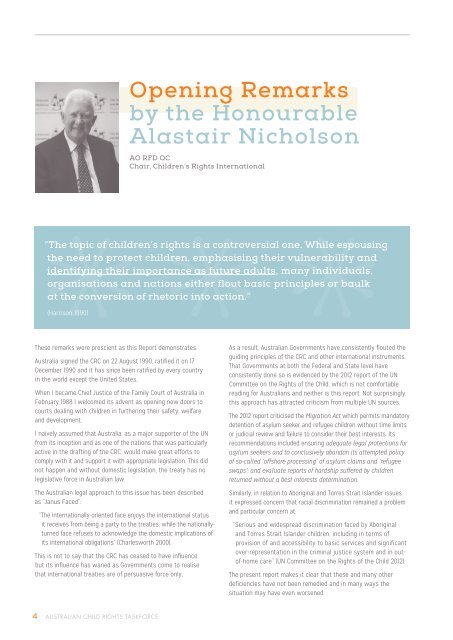CRC25 Australian Progress Report 2016
In Australia, many children have received the historical benefits of a developed economy, a high functioning health system, accessible education, a good social welfare system and labour force protection for working families. Yet there are a significant number of children who have missed out on these ‘safety net’ benefits through entrenched poverty, discrimination, social exclusion and disadvantage. This report considers the significant progress, or lack thereof for children across a number of key social policy areas including family life, education, justice and health, and what this has meant for children.
In Australia, many children have received the historical benefits of a developed economy, a high functioning health system, accessible education, a good social welfare system and labour force protection for working families. Yet there are a significant number of children who have missed out on these ‘safety net’ benefits through entrenched poverty, discrimination, social exclusion and disadvantage.
This report considers the significant progress, or lack thereof for children across a number of key social policy areas including family life, education, justice and health, and what this has meant for children.
Create successful ePaper yourself
Turn your PDF publications into a flip-book with our unique Google optimized e-Paper software.
Opening Remarks<br />
by the Honourable<br />
Alastair Nicholson<br />
AO RFD QC<br />
Chair, Children’s Rights International<br />
“The topic of children’s rights is a controversial one. While espousing<br />
the need to protect children, emphasising their vulnerability and<br />
identifying their importance as future adults, many individuals,<br />
organisations and nations either flout basic principles or baulk<br />
at the conversion of rhetoric into action.”<br />
(Harrison 1990)<br />
These remarks were prescient as this <strong>Report</strong> demonstrates.<br />
Australia signed the CRC on 22 August 1990, ratified it on 17<br />
December 1990 and it has since been ratified by every country<br />
in the world except the United States.<br />
When I became Chief Justice of the Family Court of Australia in<br />
February 1988 I welcomed its advent as opening new doors to<br />
courts dealing with children in furthering their safety, welfare<br />
and development.<br />
I naively assumed that Australia, as a major supporter of the UN<br />
from its inception and as one of the nations that was particularly<br />
active in the drafting of the CRC, would make great efforts to<br />
comply with it and support it with appropriate legislation. This did<br />
not happen and without domestic legislation, the treaty has no<br />
legislative force in <strong>Australian</strong> law.<br />
The <strong>Australian</strong> legal approach to this issue has been described<br />
as “Janus Faced”:<br />
“The internationally-oriented face enjoys the international status<br />
it receives from being a party to the treaties; while the nationallyturned<br />
face refuses to acknowledge the domestic implications of<br />
its international obligations” (Charlesworth 2000).<br />
This is not to say that the CRC has ceased to have influence,<br />
but its influence has waned as Governments come to realise<br />
that international treaties are of persuasive force only.<br />
As a result, <strong>Australian</strong> Governments have consistently flouted the<br />
guiding principles of the CRC and other international instruments.<br />
That Governments at both the Federal and State level have<br />
consistently done so is evidenced by the 2012 report of the UN<br />
Committee on the Rights of the Child, which is not comfortable<br />
reading for <strong>Australian</strong>s and neither is this report. Not surprisingly,<br />
this approach has attracted criticism from multiple UN sources.<br />
The 2012 report criticised the Migration Act which permits mandatory<br />
detention of asylum seeker and refugee children without time limits<br />
or judicial review and failure to consider their best interests. Its<br />
recommendations included ensuring adequate legal protections for<br />
asylum seekers and to conclusively abandon its attempted policy<br />
of so-called “offshore processing” of asylum claims and “refugee<br />
swaps”; and evaluate reports of hardship suffered by children<br />
returned without a best interests determination.<br />
Similarly, in relation to Aboriginal and Torres Strait Islander issues<br />
it expressed concern that racial discrimination remained a problem<br />
and particular concern at:<br />
“Serious and widespread discrimination faced by Aboriginal<br />
and Torres Strait Islander children, including in terms of<br />
provision of and accessibility to basic services and significant<br />
over-representation in the criminal justice system and in outof-home<br />
care” (UN Committee on the Rights of the Child 2012).<br />
The present report makes it clear that these and many other<br />
deficiencies have not been remedied and in many ways the<br />
situation may have even worsened.<br />
4<br />
AUSTRALIAN CHILD RIGHTS TASKFORCE


